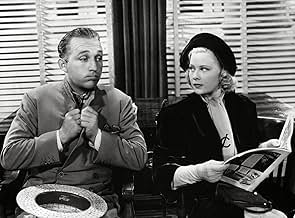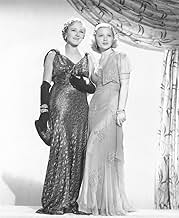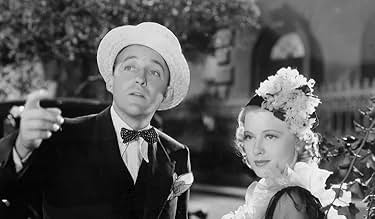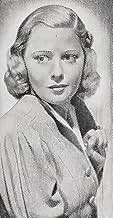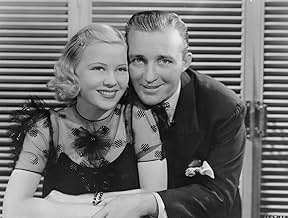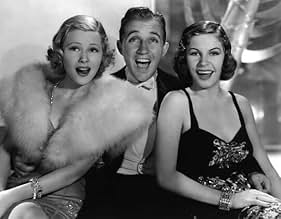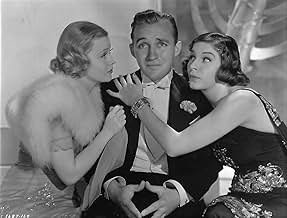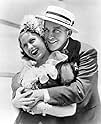IMDb RATING
6.4/10
300
YOUR RATING
According to the will of an eccentric millionaire, one of four randomly chosen strangers will become his heir if he/she can double $5000 by honest means.According to the will of an eccentric millionaire, one of four randomly chosen strangers will become his heir if he/she can double $5000 by honest means.According to the will of an eccentric millionaire, one of four randomly chosen strangers will become his heir if he/she can double $5000 by honest means.
Featured reviews
'Double or Nothing' is one of the long series of pleasant musical-comedy vehicles for Bing Crosby which were ground out so efficiently by Paramount in the late 1930s. This is one of Bing's best films from this period (not yet the peak of his career), and it features an excellent supporting cast, including veteran supporting actors William Frawley and Samuel S. Hinds. Interestingly, Frawley and Hinds are both cast against type here. Frawley usually played cynics or outright crooks, whilst Hinds usually played figures of great moral strength and probity. In 'Double or Nothing', Frawley is naive enough to get suckered by Hinds, who here plays a respected stockbroker from an old-money family: a typical Hinds role, except that this time he's secretly a crook.
SLIGHT SPOILERS COMING. The plot of this film is intriguing. An eccentric millionaire arranges for wallets to be scattered throughout New York City, each wallet containing some cash and a return address. Bing Crosby plays his usual role of an easy-going guy with no money, but in this film he's honest with it. When Bing's dog finds one of the wallets and brings it to him, Bing realises he's got to return the cash to the address inside the wallet. Three other people (Frawley, Martha Raye and Andy Devine) have also returned the wallets they found. All the other wallets were found by people who kept the money.
It turns out that this was an honesty test. The wealthy scion of the Clark family has decided to disinherit his scheming relatives in favour of these four honest souls. Each is given a cheque for one million dollars under unusual terms: each one must try to double this money within 30 days, by honest enterprise. Whoever succeeds will inherit the entire Clark fortune. If all four fail, the fortune goes to Clark's greedy relatives.
Surprisingly, Frawley loses his million straight off when Jonathan Clark (Hinds) offers to invest it for him. Frawley knows that it's in Jonathan's interests for Frawley to LOSE his money (so that Jonathan can inherit), yet he hands his cheque to Jonathan anyway. I found this extremely contrived, but the casting of Frawley and Hinds against type brings some novelty to this scene.
Jangle-voiced Andy Devine (whom I always disliked) invests his money in a driving range. Hollywood's great comedy drunkard Arthur Housman wreaks mayhem for Devine. Martha Raye plays a former striptease artist named Liza Lou. This is good casting; Martha Raye is best remembered for her peculiar facial features, but at this point in her career she had an excellent figure. Liza Lou used to take off her clothes to the tune of a ditty called 'It's On, It's Off' ... and now whenever she hears this tune she finds herself compelled to take her clothes off. Naturally, the scheming Clarks arrange for a steam calliope to play this tune at a very embarrassing moment.
'Double or Nothing' is a Bing Crosby movie, so you can guess which one of the four contestants wins the millions. Bing uses his inheritance to start up a nightclub. For some reason, the greeter in the nightclub is a donkey... or rather a stuntman who walks on all fours, wearing a surprisingly realistic donkey costume. This was rather a bizarre touch that didn't add anything to the movie. Also, Bing (who was right-handed) plays a character named Lefty, but in this role Bing doesn't seem to be more left-handed than usual. Benny Baker (whom I never found funny) makes a brief and unpleasant appearance as a sailor in a hire-rowboat.
The songs in 'Double or Nothing' are pleasant but unremarkable, and there's some classical music during Martha Raye's water ballet. A nice time-passer: not one of Bing's best films, but definitely much better than 'Doctor Rhythm' and some other Bing bungles. I'll rate 'Double or Nothing' 7 out of 10.
SLIGHT SPOILERS COMING. The plot of this film is intriguing. An eccentric millionaire arranges for wallets to be scattered throughout New York City, each wallet containing some cash and a return address. Bing Crosby plays his usual role of an easy-going guy with no money, but in this film he's honest with it. When Bing's dog finds one of the wallets and brings it to him, Bing realises he's got to return the cash to the address inside the wallet. Three other people (Frawley, Martha Raye and Andy Devine) have also returned the wallets they found. All the other wallets were found by people who kept the money.
It turns out that this was an honesty test. The wealthy scion of the Clark family has decided to disinherit his scheming relatives in favour of these four honest souls. Each is given a cheque for one million dollars under unusual terms: each one must try to double this money within 30 days, by honest enterprise. Whoever succeeds will inherit the entire Clark fortune. If all four fail, the fortune goes to Clark's greedy relatives.
Surprisingly, Frawley loses his million straight off when Jonathan Clark (Hinds) offers to invest it for him. Frawley knows that it's in Jonathan's interests for Frawley to LOSE his money (so that Jonathan can inherit), yet he hands his cheque to Jonathan anyway. I found this extremely contrived, but the casting of Frawley and Hinds against type brings some novelty to this scene.
Jangle-voiced Andy Devine (whom I always disliked) invests his money in a driving range. Hollywood's great comedy drunkard Arthur Housman wreaks mayhem for Devine. Martha Raye plays a former striptease artist named Liza Lou. This is good casting; Martha Raye is best remembered for her peculiar facial features, but at this point in her career she had an excellent figure. Liza Lou used to take off her clothes to the tune of a ditty called 'It's On, It's Off' ... and now whenever she hears this tune she finds herself compelled to take her clothes off. Naturally, the scheming Clarks arrange for a steam calliope to play this tune at a very embarrassing moment.
'Double or Nothing' is a Bing Crosby movie, so you can guess which one of the four contestants wins the millions. Bing uses his inheritance to start up a nightclub. For some reason, the greeter in the nightclub is a donkey... or rather a stuntman who walks on all fours, wearing a surprisingly realistic donkey costume. This was rather a bizarre touch that didn't add anything to the movie. Also, Bing (who was right-handed) plays a character named Lefty, but in this role Bing doesn't seem to be more left-handed than usual. Benny Baker (whom I never found funny) makes a brief and unpleasant appearance as a sailor in a hire-rowboat.
The songs in 'Double or Nothing' are pleasant but unremarkable, and there's some classical music during Martha Raye's water ballet. A nice time-passer: not one of Bing's best films, but definitely much better than 'Doctor Rhythm' and some other Bing bungles. I'll rate 'Double or Nothing' 7 out of 10.
Bing Crosby croons his way effortlessly through this little romp, while Martha Raye and Andy Devine provide the comedy, cloyingly at times. The plot, intriguing if not original, involves a dying millionaire who instructs his lawyers to drop twenty-five wallets containing a $100 bill on the streets of New York City in order to find honest people who will attempt to return them to their owner. Each winner is then given $5,000, and the first one to double that money within 30 days will receive the entire estate: $1 million. The plot is frequently interrupted by musical interludes, since Crosby plans to double his money by opening a nightclub.
The story is contrived and start-stop-start in places, the night-club sequence has a lot of great touches but is perhaps overlong and the donkey-dressed stuntman was odd and unnecessary. Double or Nothing still makes for pleasant viewing. The sets are lavish, especially the lake set in It's On, It's Off, and the photography and direction are straightforward and efficiently organised. The music score has the right amount of lushness, energy and whimsy, complete with some fitting classical music, and the songs are great though not among the greatest tunes of any Bing Crosby film. The standouts are It's On, It's Off, Smarty and especially the heavenly The Moon Got in My Eyes. The choreography is lively and cleverly done, the water ballet forming It's On, It's Off is the most memorable but Ames and Amos' tango and the slow motion fight are worth looking out for as well. The dialogue crackles with wit and fits the term escapist entertainment just fine. There is a fair bit of nonsense in the goings-on but it is pleasant and part of the fun. Bing Crosby looks very comfortable here and his voice is as handsome as ever, The Moon Got in My Eyes is sung so beautifully by him and suits him like a glove. Mary Carlisle is charming, Andy Devine is amusing and William Frawley likewise. Martha Raye won't be for all tastes, her comedy can be quite farcical and not in the most subtle of ways but she looks as though she's having a whale of a time and despite having more to do she's not as emphatic as she was in Waikiki Wedding(though she was still fun in that too). Overall, good pleasant fun. 7/10 Bethany Cox
in 1937, paramount films, along with other studios, was in deep trouble in the recession. bing crosby was paramount's main source of easy money. the public then was willing to see anything with bing in it, or for that matter, hear him on records and on the radio. in "double or nothing", bing gave them some of all three media. four crosby-type numbers, "smarty", "the natural thing to do", "moon got in my eyes","all you wanna do is dance" which crosby does with that effortless, casual insouciance for which he was so famous. at that time, crosby's kraft music hall was one of the top radio shows, and the night club scene had bing emceeing just as he did on radio. pretty mary carlisle is the love interest, and a capable cast of martha raye (great in "it's on, it's off"), bill frawley, andy devine round out the foursome, with bing, trying to win the million dollar jackpot, courtesy of a multi-millionaire's whimsy. samuel s. hinds (jimmy stewart's father in "it's a wonderful life") plays one of his hundreds of supporting roles, as bing & co's adversary. not a "great" movie, but a thoroughly enjoyable one.
The film begins with some lawyers walking about town deliberately dropping wallets and purses so that someone will find them. Each is filled with $100 and an address. Four folks return the money and the four are invited to the reading of a very eccentric will. They will each be given $5000 and the first to double this HONESTLY will become heir to a $1,000,000 fortune. And, if none of them can double the money within 30 days, then the money goes to the dead man's brother and his family.
The brother, not surprisingly, is NOT happy about this scheme but instead of voicing his anger towards the four, he convinces his family to pretend to want to help them. He tells them that he doesn't need or want the money and asks them all to dinner. And, in turn, the family convince several of them to invest in stupid money-losing schemes. The problem is that the daughter (Mary Carlisle) starts to feel sorry for them--particularly Lefty (Bing Crosby).
The same DVD that contains "Double or Nothing" also contains "Waikiki Wedding". Both are Bing Crosby films and both feature Martha Raye prominently. I was NOT thrilled to see this, as Raye's brash manner is the opposite of Crosby's gentle image. Additionally, her singing is also the opposite--making up for her lack of a decent voice by increasing her volume--whereas Crosby was smooth made his songs seem natural and likable. As a result, practically every scene with her seemed like a chore to watch and greatly detracted from an otherwise pleasant story. Because of this, the film loses a few points. It also loses a few points for the final portion of the film--with too many weird review acts as well as a finale that in mindblowingly weird (such as the 'sing band') and impossible--especially with only $5000 to spend!
The brother, not surprisingly, is NOT happy about this scheme but instead of voicing his anger towards the four, he convinces his family to pretend to want to help them. He tells them that he doesn't need or want the money and asks them all to dinner. And, in turn, the family convince several of them to invest in stupid money-losing schemes. The problem is that the daughter (Mary Carlisle) starts to feel sorry for them--particularly Lefty (Bing Crosby).
The same DVD that contains "Double or Nothing" also contains "Waikiki Wedding". Both are Bing Crosby films and both feature Martha Raye prominently. I was NOT thrilled to see this, as Raye's brash manner is the opposite of Crosby's gentle image. Additionally, her singing is also the opposite--making up for her lack of a decent voice by increasing her volume--whereas Crosby was smooth made his songs seem natural and likable. As a result, practically every scene with her seemed like a chore to watch and greatly detracted from an otherwise pleasant story. Because of this, the film loses a few points. It also loses a few points for the final portion of the film--with too many weird review acts as well as a finale that in mindblowingly weird (such as the 'sing band') and impossible--especially with only $5000 to spend!
Did you know
- TriviaOne of over 700 Paramount Productions, filmed between 1929 and 1949, which were sold to MCA/Universal in 1958 for television distribution, and have been owned and controlled by Universal ever since; its earliest documented telecast took place in Seattle Tuesday 25 November 1958 on on KIRO (Channel 7); it was released on DVD 14 November 2006 as one of 5 titles in Universal's Bing Crosby Screen Legend Collection, and again 11 November 2014 as one of 24 titles in Universal's Bing Crosby Silver Screen Collection.
- Quotes
Jonathan Clark: Will you have a cocktail?
Liza Lou Lane: No. No alcohol, kid. I get a feelin'z good.
Vicki Clark: What's the matter with feeling good?
Liza Lou Lane: Oh, you don't know how good I can feel.
- ConnectionsEdited into Chop Suey (2001)
- SoundtracksDouble or Nothing
(uncredited)
Lyrics by Johnny Burke
Music by Victor Young
Played and sung by vocal group during opening credits.
Reprised at the Four Winds Club opening
Details
- Runtime
- 1h 30m(90 min)
- Color
- Aspect ratio
- 1.37 : 1
Contribute to this page
Suggest an edit or add missing content

